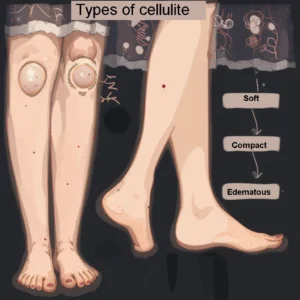
Healthy Lymphatic System: Why It’s Key to Your Daily Well-Being
Healthy Lymphatic System: Why It’s Key to Your Daily Well-Being
Healthy lymphatic system is an expression that, without a doubt, is gaining more and more strength in the field of wellness and preventive health. Although many people don’t think about it daily, this system is essential for maintaining the body’s balance, protecting it from disease, and even directly contributing to cellular cleansing. Therefore, keeping it in good condition is not only advisable, but also represents a direct investment in your quality of life.
In this article, in addition to understanding exactly what the lymphatic system is, you’ll discover why it’s so important to take care of it. We’ll also explore how it works, what signs indicate it might not be working properly, and, above all, what healthy habits you can adopt to strengthen it. You’ll also find practical and effective tips that you can easily integrate into your daily routine in a simple and sustainable way.
1. What is the lymphatic system?

The lymphatic system is a complex network that runs through almost the entire human body. It is made up of lymph vessels, lymph nodes, the spleen, the thymus, and the tonsils. Its main function is to transport lymph, a fluid containing white blood cells responsible for fighting infections. This system is also responsible for removing cellular waste, toxins, and other unwanted substances from the body.
Unlike the circulatory system, the lymphatic system doesn’t have a pump like the heart. Instead, lymph moves through muscle contraction, breathing, and daily physical movement. Therefore, physical activity is key to its efficient function.
2. Why is a healthy lymphatic system so important?
Having a healthy lymphatic system provides multiple benefits for the body. It not only protects against infections and diseases, but also:
- Improves fluid circulation
- Reduces inflammation
- Promotes cellular detoxification
- Boosts the immune system
- Reduces fluid retention
Furthermore, when this system weakens, symptoms such as chronic fatigue, swelling, frequent infections, joint pain, and skin problems can appear. Therefore, keeping it strong and functional is essential for a full life.
3. Warning Signs of a Sluggish Lymphatic System
The human body naturally sends signals when something isn’t working properly. In the case of the lymphatic system, these warnings can help you prevent major complications if detected early. Some of the most common symptoms include:
- Swollen lymph nodes (neck, armpits, groin)
- Constant fatigue for no apparent reason
- A feeling of heaviness or swelling in the legs and arms
- Dry skin or rashes
- Unexplained muscle and joint pain
Therefore, if you experience these symptoms frequently, it is advisable to consult a healthcare professional. Furthermore, taking prompt action can prevent problems from worsening.
4. Daily Habits
Adopting certain daily habits can make a big difference in the health of your lymphatic system. In fact, you don’t need to make drastic changes to notice improvements. Here’s a list of effective practices you can start implementing today:
List of recommended habits:
- Drink enough water: Hydration is essential to keep lymph fluid and constantly moving.
- Exercise regularly: Activities such as walking, swimming, or yoga stimulate lymphatic circulation.
- Breathe deeply: Deep breathing works as a natural pump to move lymph.
- Dry skin brushing: This simple technique improves lymphatic drainage and removes dead cells.
- Lymphatic massages: These gentle massages help decongest lymph nodes and improve lymphatic flow.
- Clean and balanced diet: Avoiding processed foods and consuming fruits, vegetables, and healthy fats greatly benefits the system.
- Avoid tight clothing: Tight clothing can hinder proper lymph flow.
- Alternate hot and cold showers: This stimulates the contraction of lymphatic vessels and promotes internal cleansing.
Furthermore, these habits are not only simple but also sustainable over the long term. Incorporating them into your routine can help prevent multiple health problems.
5. Nutrition for a healthy system
Nutrition has a direct impact on the body, and the lymphatic system is no exception. For a healthy lymphatic system, there are key foods that should be included in your regular diet:
- Citrus fruits: Rich in vitamin C and antioxidants, they are ideal for strengthening the immune system.
- Cruciferous vegetables: Such as broccoli, kale, and cauliflower, which support the natural detoxification process.
- Garlic and onion: Powerful antimicrobials that boost immunity.
- Ginger and turmeric: Reduce inflammation and promote lymphatic drainage.
- Chia and flax seeds: Provide omega-3 fatty acids and reduce systemic inflammation.
In addition, avoiding processed foods, excess sugars, and trans fats is equally important for maintaining lymphatic balance.
6. The role of exercise
Physical movement is undoubtedly essential for maintaining a healthy lymphatic system. While the circulatory system relies on the heart as a pump, the lymphatic system depends on external movement to function properly.
Low-impact exercises such as trampoline (rebounding), walking, yoga, or gentle cycling are ideal for promoting lymphatic flow. You only need 20 to 30 minutes a day to begin to notice improvements.
In addition, avoiding prolonged sedentary lifestyles is key. Therefore, if you work many hours sitting down, it is important to get up, stretch, or walk at least once an hour.
7. Natural Therapies That Support the Lymphatic System
In addition to healthy habits and nutrition, there are natural therapies that can complement the care of your lymphatic system. Some recommended options include:
- Manual lymphatic drainage: A technique with gentle, rhythmic movements that stimulate lymph flow.
- Infrared therapies: Promote the elimination of toxins through therapeutic heat.
- Epsom salt baths: Relax the body and help eliminate metabolic waste through the skin.
- Aromatherapy with essential oils: Such as grapefruit, juniper, or cypress, which stimulate lymphatic circulation.
These alternatives, while not a substitute for conventional medical treatment, can be excellent allies in prevention and overall well-being.
Conclusion
Maintaining a healthy lymphatic system is undoubtedly an effective strategy for preventing disease, strengthening the immune system, and increasing your daily energy. Therefore, adopting habits such as good hydration, a clean diet, consistent physical activity, and natural therapies can make a big difference in your overall well-being.
The body, although it has mechanisms to self-regulate and heal, needs your collaboration to function properly. Paying attention to the signs, making conscious choices, and seeking balance between body and mind will allow you to enjoy lasting health.
Remember: taking care of your lymphatic system today is investing in your well-being tomorrow.
Explore other related articles by clicking here and Visit the official website here




